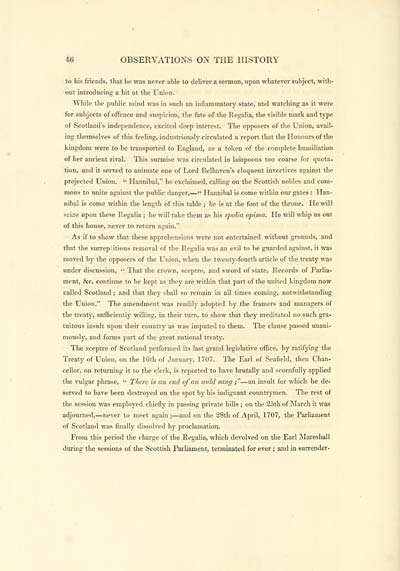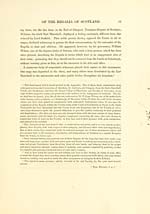Bannatyne Club > Papers relative to the Regalia of Scotland
(82) Page 46
Download files
Complete book:
Individual page:
Thumbnail gallery: Grid view | List view

46 OBSERVATIONS ON THE HISTORY
to his friends, that he was never able to deliver a sermon, upon whatever subject, with-
out introducing a hit at the Union.
^Vhile the public mind was in such an inflammatory state, and watching as it were
for subjects of ofTence and suspicion, the fate of the Regalia, the visible mark and type
of Scotland's independence, excited deep interest. The opposers of the Union, avail-
ing themselves of this feeling, industriously circulated a report that the Honours of the
kingdom were to be transported to England, as a token of the complete humiliation
of her ancient rival. This surmise was circulated in lainpoons too coarse for quota-
tion, and it served to animate one of Lord Belhaven's eloquent invectives against the
projected Union. " Hannibal," he exclaimed, calling on the Scottish nobles and com-
mons to unite against the public danger, — " Hannibal is come within our gates : Han-
nibal is come within the length of this table ; he is at the foot of the throne. He will
seize upon these Regalia ; he will take them as his spolia opima. He will whip us out
of this house, never to return again."
As if to show that these apprehensions were not entertained without grounds, and
that the surrep'itious removal of the Regalia was an evil to be guarded against, it was
moved by the opposers of the Union, when the twenty-fourth article of the treaty was
under discussion, " That the crown, sceptre, and sword of state. Records of Parlia-
ment, &c. continue to be kept as they are within that part of the united kingdom now
called Scotland ; and that they shall so remain in all times coming, notwithstanding
the Union." The amendment was readily adopted by the framers and managers of
the treaty, sufficiently willing, in their turn, to show that they meditated no such gra-
tuitous insult upon their country as was imputed to them. The clause passed unani-
mously, and forms part of the great national treaty.
The sceptre of Scotland performed its last grand legislative office, by ratifying tlie
Treaty of Union, on the 16th of January, 1707. The Earl of Seafield, then Chan-
cellor, on returning it to the clerk, is reported to have brutally and scornfully applied
the vulgar phrase, " There is an end of an mild sang ;" — an insult for which he de-
served to have been destroyed on the spot by his indignant countrymen. The rest of
the session was employed chiefly in passing private bills ; on the 23th of March it was
adjourned, — never to meet again ; — and on the 28th of April, 1707, the Parliament
of Scotland was finally dissolved by proclamation.
From this period the charge of the Regalia, which devolved on the Earl iSIaieshall
during the sessions of the Scottish Parliament, terminated for ever ; and in surrender-
to his friends, that he was never able to deliver a sermon, upon whatever subject, with-
out introducing a hit at the Union.
^Vhile the public mind was in such an inflammatory state, and watching as it were
for subjects of ofTence and suspicion, the fate of the Regalia, the visible mark and type
of Scotland's independence, excited deep interest. The opposers of the Union, avail-
ing themselves of this feeling, industriously circulated a report that the Honours of the
kingdom were to be transported to England, as a token of the complete humiliation
of her ancient rival. This surmise was circulated in lainpoons too coarse for quota-
tion, and it served to animate one of Lord Belhaven's eloquent invectives against the
projected Union. " Hannibal," he exclaimed, calling on the Scottish nobles and com-
mons to unite against the public danger, — " Hannibal is come within our gates : Han-
nibal is come within the length of this table ; he is at the foot of the throne. He will
seize upon these Regalia ; he will take them as his spolia opima. He will whip us out
of this house, never to return again."
As if to show that these apprehensions were not entertained without grounds, and
that the surrep'itious removal of the Regalia was an evil to be guarded against, it was
moved by the opposers of the Union, when the twenty-fourth article of the treaty was
under discussion, " That the crown, sceptre, and sword of state. Records of Parlia-
ment, &c. continue to be kept as they are within that part of the united kingdom now
called Scotland ; and that they shall so remain in all times coming, notwithstanding
the Union." The amendment was readily adopted by the framers and managers of
the treaty, sufficiently willing, in their turn, to show that they meditated no such gra-
tuitous insult upon their country as was imputed to them. The clause passed unani-
mously, and forms part of the great national treaty.
The sceptre of Scotland performed its last grand legislative office, by ratifying tlie
Treaty of Union, on the 16th of January, 1707. The Earl of Seafield, then Chan-
cellor, on returning it to the clerk, is reported to have brutally and scornfully applied
the vulgar phrase, " There is an end of an mild sang ;" — an insult for which he de-
served to have been destroyed on the spot by his indignant countrymen. The rest of
the session was employed chiefly in passing private bills ; on the 23th of March it was
adjourned, — never to meet again ; — and on the 28th of April, 1707, the Parliament
of Scotland was finally dissolved by proclamation.
From this period the charge of the Regalia, which devolved on the Earl iSIaieshall
during the sessions of the Scottish Parliament, terminated for ever ; and in surrender-
Set display mode to: Large image | Transcription
Images and transcriptions on this page, including medium image downloads, may be used under the Creative Commons Attribution 4.0 International Licence unless otherwise stated. ![]()
| Publications by Scottish clubs > Bannatyne Club > Papers relative to the Regalia of Scotland > (82) Page 46 |
|---|
| Permanent URL | https://digital.nls.uk/81105060 |
|---|
| Description | Place of publication Edinburgh unless otherwise stated. No. 125 is relative to but not part of the club's series. |
|---|---|

